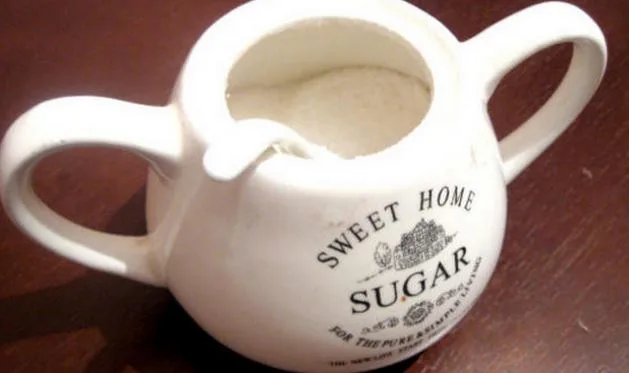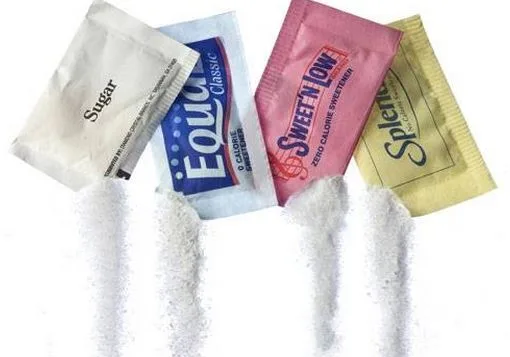Good sweetener, bad sweetener: a guide to sugars, natural and artificial
By Susan Schenck
Most people are aware that they need to cut back on sugar, or at least choose their poison carefully. Sugar is so bad for the health of the body and brain that nowadays, doctors are even calling Alzheimer’s “type 3 diabetes.” Unhealthful sugars stimulate insulin, the hormone whose main message is “Store fat!” It’s also antagonistic to Human Growth Hormone, which keeps us youthful. Sugar decays the teeth and causes AGEs (advanced glycation end products, compounds that accelerate aging and disease). Artificial sugars can be even worse; though allegedly “safe,” they create all kinds of disease in the body.
even calling Alzheimer’s “type 3 diabetes.” Unhealthful sugars stimulate insulin, the hormone whose main message is “Store fat!” It’s also antagonistic to Human Growth Hormone, which keeps us youthful. Sugar decays the teeth and causes AGEs (advanced glycation end products, compounds that accelerate aging and disease). Artificial sugars can be even worse; though allegedly “safe,” they create all kinds of disease in the body.
Let’s take a look at some of the pros and cons of popular sweeteners.
Table sugar: Also known as sucrose, most are aware that it spikes insulin and is bad for teeth.
Fruit: Unfortunately, most fruit is high in fructose. Fructose is found in honey, agave, tree and vine fruits, flowers, berries, and most root vegetables, and is frequently derived from sugar cane, sugar beets, and corn. Fructose raises triglycerides like no other food. It leaves you with an insatiable appetite, making you overeat. In fact, high-fructose corn syrup is one of the main factors in the obesity epidemic in the U.S. Studies show that fructose enables glycation reactions (when sugar interacts with protein and wreaks havoc, causing wrinkles for example), ten times more rapidly than the common-sugar glucose. It increases blood levels of uric acid, leading to gout and elevated blood pressure. It causes deposition of fat in the liver, potentially leading to non-alcoholic fatty liver disease. Like table sugar, it can trigger insulin resistance, which ultimately leads to obesity and type 2 diabetes.
Paleo man ate wild fruit rich in minerals. Nowadays, however, it’s not wise to eat too much fruit, as it has been hybridized for sweetness. When I ate a lot of fruit as a raw-food vegan, my triglycerides went through the roof! Stick with nonsweet fruits such as lemons, limes, green apples, berries, zucchini, cucumbers, and tomatoes.
Sugar alcohols: Xylitol is the most popular of the sugar alcohols and tastes just like sugar, though it has half the calories. It also actually has a good effect on the teeth, unlike table sugar. Some people just can’t handle it or may have to ease into using it gradually. It can cause bloating, abdominal pain and cramping, diarrhea, flatulence, or constipation.
 Aspartame: Aspartame turns into wood alcohol in the blood. It’s a neurotoxin, destroying millions of neurons to the point that it can cause up to 92 side effects on the nervous system, including tremors that resemble Parkinson’s, headaches, tinnitus, blindness, and a whole lot more. Once, when I hadn’t used it in over a year, I accidentally ingested some of this, hidden in a drink, and experienced an episode of MS-like symptoms, losing the function of nerves in my arms and dropping a bowl of soup on the floor! Ditch this stuff, as it can eventually ruin your health. I personally know of people who have reversed MS symptoms and tremors and migraines simply by getting off diet sodas sweetened with aspartame. Entire books have been written on this subject, including Russell Blaylock, MD’s book, Excitotoxins: The Taste that Kills, and Janet Starr Hull’s Sweet Poison.
Aspartame: Aspartame turns into wood alcohol in the blood. It’s a neurotoxin, destroying millions of neurons to the point that it can cause up to 92 side effects on the nervous system, including tremors that resemble Parkinson’s, headaches, tinnitus, blindness, and a whole lot more. Once, when I hadn’t used it in over a year, I accidentally ingested some of this, hidden in a drink, and experienced an episode of MS-like symptoms, losing the function of nerves in my arms and dropping a bowl of soup on the floor! Ditch this stuff, as it can eventually ruin your health. I personally know of people who have reversed MS symptoms and tremors and migraines simply by getting off diet sodas sweetened with aspartame. Entire books have been written on this subject, including Russell Blaylock, MD’s book, Excitotoxins: The Taste that Kills, and Janet Starr Hull’s Sweet Poison.
Furthermore, since toxins mess with your metabolism and can even make your body store fat, this sweetener is not a good choice for weight control.
Splenda: According to Dr. Mercola (www.mercola.com), Splenda is “a chlorinated artificial sweetener in line with aspartame and saccharin, and with detrimental health effects to match.” Potential health risks associated to Splenda include seizures, dizziness, migraines, allergic reactions, weight gain, increases in blood sugar, blurred vision, and gastrointestinal issues.
Honey: Honey has enzymes and health benefits. One tablespoon has 64 calories, but is very high in carbs. Raw honey appears to spike insulin less than that which has been heat processed.
Stevia: Stevia is a natural plant, grown locally, in fact. It has 200 times the sweetness of table sugar, so it should be used sparingly; if you overdo it, it actually leaves a bitter aftertaste. NuNaturals from the U.S. uses the premium part of the plant, which is not bitter. Stevia has no side effects, but it’s not the best-tasting sweetener.
Yacon Root Syrup: For those who have found health heaven in a low-carb diet, yacon root syrup is a savior. It’s made in Peru, a superfood that not only doesn’t stimulate insulin and contains only 15 calories a tablespoon, but also feeds the good gut bacteria.
The drawback? It’s expensive. When I first moved to Ecuador five years ago, I bought it online and had it sent from the States. What a carbon footprint! It would go from Peru to the U.S., then back to me in Ecuador. Now however, we can get it at Tienda Nectar (on Benigno Malo 12-27, open 11 to 4 Monday through Friday). It’s an acquired taste that has enabled me to enjoy livin’ la vida low carb, having my low-carb cake and eating it, too. It used to cost $10 for about a cup, but when the Chinese discovered it, the price went up to $15! I use it in my low-carb food-prep classes for most desserts.
Susan Schenck, author of The Live Food Factor and Beyond Broccoli does raw ketogenic food classes and health coaching. Another book of hers you might enjoy is Expats in Cuenca, Ecuador: The Magic & The Madness. She may be contacted at LiveFoodFactor@Yahoo.com.






















